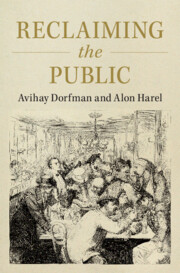Book contents
- Reclaiming the Public
- Reclaiming the Public
- Copyright page
- Dedication
- Contents
- Acknowledgments
- Introduction
- 1 A Public Conception of Political Authority
- 2 Law as Standing
- 3 Speaking in a Different Voice
- 4 Inherently Public Goods
- 5 Against Privatization as Such
- 6 Public Ownership
- 7 Why Not Artificial Intelligence?
- Concluding Remarks
- Index
4 - Inherently Public Goods
Published online by Cambridge University Press: 22 February 2024
- Reclaiming the Public
- Reclaiming the Public
- Copyright page
- Dedication
- Contents
- Acknowledgments
- Introduction
- 1 A Public Conception of Political Authority
- 2 Law as Standing
- 3 Speaking in a Different Voice
- 4 Inherently Public Goods
- 5 Against Privatization as Such
- 6 Public Ownership
- 7 Why Not Artificial Intelligence?
- Concluding Remarks
- Index
Summary
The privatization of government functions has given rise to instrumental questions concerning the execution of these functions. Proponents often hail the efficiency of private institutions, while opponents often speak of the accountability of public institutions. This chapter challenges the instrumentalist terms of this debate. It establishes that there are principled, noninstrumentalist arguments against the privatization of certain goods. More particularly, it argues that there are goods that are “inherently public,” namely that they cannot be provided by private entities, even in principle.
The chapter also maintains that to count as an act of the state, the person who provides the good (the key case studies are inflicting criminal punishment and waging wars) must be a public official. To defend this latter position, the chapter develops an abstract account of public officials as agents who defer to the state’s judgments.
- Type
- Chapter
- Information
- Reclaiming the Public , pp. 94 - 123Publisher: Cambridge University PressPrint publication year: 2024

